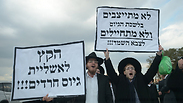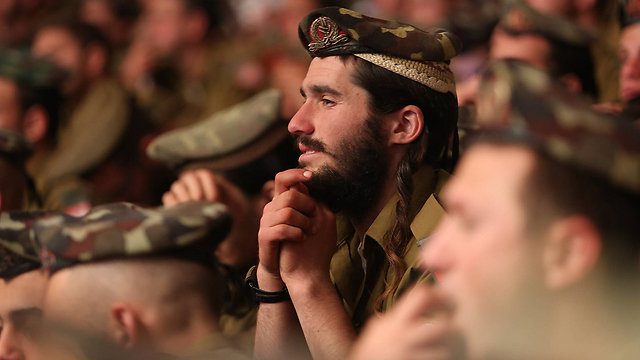
IDF draft law must be stopped
Analysis: Instead of advancing an equal share of the burden, the law proposed by the Shaked Committee will only increase inequality.
Serving in Chabad offices abroad or helping teach in yeshivot cannot be considered as carrying the burden. I doubt that even the 17 months of high-quality and motivated service by hesder yeshiva students can really be considered as the equivalent of the three years of a fellow soldier from the Nahal Brigade, for example.
I doubt the suggested legislation will speed up the integration of young men and women into the workforce either. The past two years have seen an increase in the number of working haredim in the Jewish sector and among women in the Arab sector. In legislation proposed by the Shaked Committee may only make a change on the margins.
Other expected damages include an addition of hundreds of millions of shekels to the defense budget and a significant gap in the quantity and quality of the manpower required by the army. The addition will be needed to fund salaries for haredim aged 22 to 24, most of whom are married and have one or two children (at least a minimum wage, meaning some NIS 5,000 a month); basic training in the core studies and technological training, which will allow the haredi recruits to function in the IDF's modern fighting, intelligence and technology corps; and special service conditions matching the haredi lifestyle.
The "hole" in manpower amounting to some 9,000 soldiers will be created as a result of cutting boys' service by four months without guaranteeing – in the coming years – that the number of young haredi and female recruits will close the gaps.
Danger of 'Jewish intifada'
These are only some of the noticeable damaging outcomes of the legislation being debated at the Shaked Committee, and those following its discussions understand just how big this disaster is. It began with the Peri Law, which passed its first reading last year and was also an odd political compromise which missed its declared purposes. But the Shaked Committee, which is supposed to determine the final law and the model of its implementation, may turn this farce into irreversible damage.
If the law sets criminal sanctions against haredi draft dodgers, as Yesh Atid wants, their implementation may create a "Jewish intifada" and perhaps even – God forbid – acts of "martyrdom" here and there. The enforcement will be expensive and the breaches in the law will allow thousands to dodge the draft very easily.
Economic sanctions according to the outline suggested by Habayit Hayehudi will not yield results either. Some of them already exist in practice and have no effect on the haredi and Bedouin dodgers. The new economic sanctions advanced by MK Ayelet Shaked are so proportionate and considerate, that I doubt they will hurt yeshiva students' motivation to dodge the draft, even on the margins. Their rabbis will make sure – with the help of donations from abroad, shticks and tricks – that the yeshiva world will continue to exist in its current format, yet frugally. Without enlisting with the IDF and without working.
The discussions must be stopped, but we still need a new law to replace the Tal Law, which was a magnificent fiasco and which expired long ago. A return to Ben-Gurion's old Security Service Law is unpractical either. We must recognize the fact that there will always be inequality when it comes to carrying the security, economic and social burden. What can be done is to reduce the injustice involved in this situation and speed up the processes which are anyway taking place at the moment – the integration into the workforce and into the Israeli society in the haredi sector and in the Arab sector.
How will it be done?
It will be done through effective financial incentives and a tight, efficient supervision system which will prevent their abuse. That's it. Patience and determination in the performance will lead to the desired change within several years (three to five). For that purpose the law must be simplified, based mainly on economic incentives – both positive and negative – and completely cleared of all those detailed clauses which complicate or even prevent its implementation.
The positive incentive will be reflected, for example (and mainly), in significant differential wages for compulsory soldiers: Junior commanders, fighters in the field corps and soldiers serving in professions requiring training or special skills will receive salaries totaling some NIS 2,000 (about $570) a month; soldiers supporting the fighting forces who do not serve in fighting units or administration roles which do not require special skills will receive a bit less, etc. Men and women in national service will receive less, etc.
Alongside a significant salary, the soldiers will be given preference in different areas after the service, in a differential manner too. For example, in admission to a workplace, in tuition loans, in bonus points for housing, etc.
This positive incentive will make even yeshiva students from the Lithuanian faction reconsider, and as long as there are negative incentives alongside the positive one: For example, if a yeshiva student dodges the draft or fails to report to the recruiting office – the pension he and his yeshiva receive from the State will be revoked. Only a predetermined number of "prodigies" in each yeshiva will get all the benefits given today, which in fact serve today as an incentive the States gives indiscriminately to all the dodgers. An efficient and tight supervision and enforcement system will guarantee that the positive incentives will not spill over into the inappropriate places and will not be abused, and that the negative incentives will be implemented literally.
According to my estimates, an implementation of the incentive principle will cost much less that an implementation of the absurd legislation materializing at the Shaked committee.
We must only make sure that in any event, the IDF and intelligence community will receive manpower at the sufficient quality and quantity for carrying out the missions. For that purpose, the Knesset and defense establishment must appoint a joint committee headed by the prime minister, which will determine the IDF and national service enlistment quotas among the haredim and Arab sector and regulate them from time to time, and adjust the incentives to the circumstances and capabilities of the economy.
This is not the place to elaborate any further, but the suggested principle is clear. The experience I have gained gives me reason to believe that it will work. Not because the intention of man's heart is good from his youth, but because the basic ambition to improve our situation and the quality of our life is deeply engraved in the human genes. Even in the genes of those who have been educated to believe that "Torah is their profession" exempts them from the duty to place a shoulder under the stretcher.











